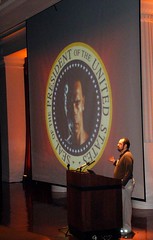September 12, 2009
Transfascists have the coolest uniforms
 Charles Stross blogged about Chrome Plated Jackboots. His basic argument is that while environment, IP, privacy or biotechnology might provide fodder for 21st century politics, they are not really the big important drivers of the new ideologies we are going to see. That is a bold and interesting prediction. He instead thinks that the product of transhumanism, the ability to actually change human nature, is going to be the explosive force. If you can change human nature, what should you change it to? That can enable many ethical and political views that currently are utterly unthinkable. Even if you cannot (yet) change humans, the widespread belief that it is possible would support many possible programs - some of which no doubt will be deeply misguided.
Charles Stross blogged about Chrome Plated Jackboots. His basic argument is that while environment, IP, privacy or biotechnology might provide fodder for 21st century politics, they are not really the big important drivers of the new ideologies we are going to see. That is a bold and interesting prediction. He instead thinks that the product of transhumanism, the ability to actually change human nature, is going to be the explosive force. If you can change human nature, what should you change it to? That can enable many ethical and political views that currently are utterly unthinkable. Even if you cannot (yet) change humans, the widespread belief that it is possible would support many possible programs - some of which no doubt will be deeply misguided.
Charles main worry is with fascism, and he lunges at what he considers to be a nascent hybrid between transhumanism and Italian fascism. As he points out, he is less worried about transhumanists becoming fascists (we are after all pretty marginal) but fascists getting transhumanist. It doesn't take a genius to realize that the basic fascist mindset combined with the right technology could become very nasty.
During the 2008 workshop on global catastrophic risks in San Jose George Dvorsky talked about what he called "hard totalitarianism". What we have seen so far is "soft totalitarianism", attempts at controlling citizens limited by technology and especially human nature. Hard totalitarianism would involve actually succeeding in this. Hard totalitarianism might turn out to be less bloody than soft totalitarianism, but far more crushing of the human potential.
Stross links to Umberto Eco's very readable essay Eternal Fascism: Fourteen Ways of Looking at a Blackshirt which is a nice look at what he calls ur-fascism, the kind of core found in all fascist-like worldviews. ("combining Saint Augustine and Stonehenge -- that is a symptom of Ur-Fascism" :-)
Reading through his analysis suggests where most modern transhumanists completely diverge from fascism. We break with the cult of tradition, we embrace modernity, we try to keep a critical mindset and we embrace diversity. In fact, the kind of transhumanism I regard myself as part of - very much "classical extropianism" - makes a virtue of having a diverse, bickering, self-organising system where knowledge is built in evolutionary ways based on empirical findings rather than handed down wisdom or rationalistic arguments (sure, I trust deductions in physics and math, but only because the empirical evidence for their reliability - I would not be as trusting of deductions in social science). Similarly it recognizes the diversity of potential human motivations and aims, which implies a need for great freedom to develop them if happiness is to be fully realized. This is why it promotes open societies - they are self-correcting and allows individual freedom. It doesn't have to assume the equal value of everybody, just that this value may well be incommensurable.
One of the most intriguing comments in Eco's essay is "In such a perspective everybody is educated to become a hero." One of the appeals of fascism today may be that it actually promises to return our heroes to us - the postmodern scepticism of heroism is deeply counter to a very human impulse to glorify exceptional people. It also reminded me of a scenario I was trying to use in a science fiction role-playing game a while ago:
The use of MPT to treat criminals started with “conscience transplantation” to psychopaths: they were given moral safeguards they previously lacked. This proved so successful that other moral therapies were developed to rehabilitate criminals. The first therapies were crude sets of rules, but as the technology advanced and the prisons were emptied the patterns became increasingly complex and ideal moral systems, adding not just morality but rehabilitative outlooks and personality traits.While many people took full advantage of MPT enhancement to give themselves positive traits and subdue or erase negative traits, Character Enhancement Therapy (CET) started out slowly. At first seen only as a treatment of criminals it soon proved its worth as many rehabilitated people demonstrated great feats of courage, dedication and other admirable qualities. In some positions such therapied and hence certifiably ethical persons were more sought after than normals. As a response both to the demand for ethics and the inspiration of many therapied examples more and more people began CET in earnest. Beyond a certain point CET became seen as necessary as proper education, a guarantee of moral health and good citizenship. While never strictly mandatory everybody got it.
As the CET wave swept society, it induced a near-total moral conformity. While a few basic character templates existed they all emphasised pro-social values and the desire to support the shared culture. Political and cultural constraints dissolved and the Federation was formed. Within the Federation everybody sought only the highest moral excellence (as defined by the Federation character templates), producing a highly efficient, courteous, bold and utopian society. Individuality was not abolished and disagreements still possible, but the shared moral spine made trust and cooperation the default.
Mental politics within the Federation is mostly about how to update the shared character templates. Different ideas, versions and theories are carefully studied before they are included in the monthly citizen patches. In general the public wants the federation to promote greater excellence, and the Federation tries to oblige.
(compare to Greg Bear's novel suite Queen of Angels, Slant and Moving Mars)
 Note that in this scenario we end up with something that might not just be compatible with much of ur-fascism, but actually takes it much further than the flawed forms discussed by Stross and Eco. Why does fascism assume different values of different people? If Eco's model is right, it is because it acts as a driver for the ideology (social frustration), because it stabilizes society and because it is the only practical possibility. But the Federation can be totally egalitarian. One could imagine a Federation inhabited with total Kantians, all recognizing human dignity and equal value but still pushing outwards with zeal. It might not be elitist. It might eschew populism and newspeak. What makes it fascist is not that morality is modified (remember, this is done on a voluntary basis) but that it converges towards an identical morality driven by social pressures.
Note that in this scenario we end up with something that might not just be compatible with much of ur-fascism, but actually takes it much further than the flawed forms discussed by Stross and Eco. Why does fascism assume different values of different people? If Eco's model is right, it is because it acts as a driver for the ideology (social frustration), because it stabilizes society and because it is the only practical possibility. But the Federation can be totally egalitarian. One could imagine a Federation inhabited with total Kantians, all recognizing human dignity and equal value but still pushing outwards with zeal. It might not be elitist. It might eschew populism and newspeak. What makes it fascist is not that morality is modified (remember, this is done on a voluntary basis) but that it converges towards an identical morality driven by social pressures.
I'm not convinced this is an attractor state of all mind-hacking societies would end up in, but it shows that with sufficiently malleable humans entirely new technoideologies become possible. It is also worth considering whether we might not wish to partially go down this road in some limited domains - do we really wish to preserve human cruelty, and would it not be desirable to move to a heroic personality in times of real crisis? The means do not matter ethically as much as the fact that by assumption large groups of people can tune themselves. To some degree all societies attempt to impose socially accepted morals on their members, it is just that this process is very inefficient and limited. If it wasn't, then we would have potential to turn into the Federation.
 But as the Federation emerges from a possibly quite liberal society and takes some of the fascist logic and turns it into something else, I also think we should expect many other possibilities - some likely very nice - of technoideologies that could emerge. Allen Buchanan did a Leverhulme lecture this spring where he suggested that enhancement may be almost a conservative duty. Transsocialists might follow From Chance to Choice in regarding enhancement as part of social justice - but in a transhuman knowledge society where transhuman capital is the important form of capital, why not try to liberate the knowledge workers further by giving them more control over the means of mental production? And translibertarians might argue that if we can remake ourselves, we might choose to become better at existing as independent rational agents than we currently are (last one to become Homo economicus is Pareto inefficient!). The potential for human nature politics looks vast, especially since it contains positive feedback loops back into the political system. I vote like I do because that is the kind of person I am - but if that personhood is affected by my votes?
But as the Federation emerges from a possibly quite liberal society and takes some of the fascist logic and turns it into something else, I also think we should expect many other possibilities - some likely very nice - of technoideologies that could emerge. Allen Buchanan did a Leverhulme lecture this spring where he suggested that enhancement may be almost a conservative duty. Transsocialists might follow From Chance to Choice in regarding enhancement as part of social justice - but in a transhuman knowledge society where transhuman capital is the important form of capital, why not try to liberate the knowledge workers further by giving them more control over the means of mental production? And translibertarians might argue that if we can remake ourselves, we might choose to become better at existing as independent rational agents than we currently are (last one to become Homo economicus is Pareto inefficient!). The potential for human nature politics looks vast, especially since it contains positive feedback loops back into the political system. I vote like I do because that is the kind of person I am - but if that personhood is affected by my votes?

